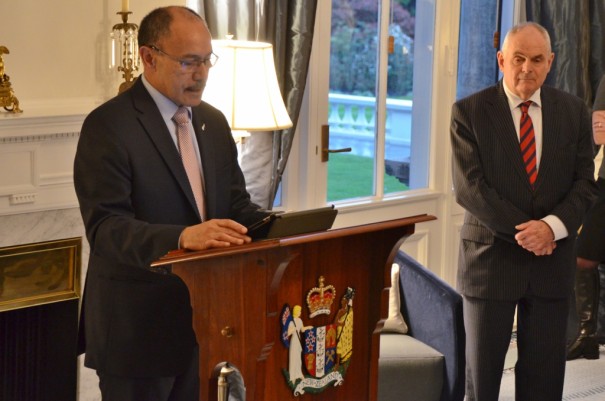Association of Former MPs

Rau rangatira mā, e kui mā, e koro mā e huihui nei, tēnei aku mihi māhana ki a koutou. Naumai haere mai rā ki te Whare Kawana o Te Whanganui-a-Tara. Distinguished guests, ladies and gentlemen, warm greetings to you all and welcome to Government House.
I specifically acknowledge: Graeme Reeves, President of the Association of Former MPs and your wife Michelle - tēnā korua.
It is a great pleasure for Janine and me to welcome you all to Government House this evening. Having become something of a tradition for a Governor-General to host a reception for the Association for Former MPs, we are delighted to continue the practice.
There’s a chance timing of this evening’s reception with the 2014 General Election. In two days time, New Zealanders will have the chance to think about our political system, what it means and how and by whom we want to be represented and governed. It is also a chance for your association to contemplate new members becoming eligible to join your ranks!
Whether your thoughts are grand or pragmatic, almost everyone here tonight has experienced what it’s like to be a voter. However, for those of you who are former Members of Parliament, or the spouse or partner of one, you have experienced politics and our democratic process from a special vantage point. This is what gives you the unique position from which to promote our form of parliamentary democracy.
Whether you had a three year term or 24 years in the Parliament, you will be most aware of its highs and lows. The activities of the last few weeks will have reminded you, fondly I’m sure, of your own days on the campaign trail – organising volunteers, rolling out the hoardings, door knocking, the polls, being on message communicating the policies and the anticipation of a result.
And the realisation that being an MP gives one a great opportunity to affect and effect change; and do good in your community and for our nation. Sometimes that can come at a cost. There are some things you’re probably glad you no longer have to put up – endless cups of lukewarm tea, the long hours and absences from home and family and personal attacks - that seem to come with the territory. As someone said once “Why pay money to have your family tree traced; go into politics and your opponents will do it for you.”
Having served your country in this way, you would be forgiven for wanting to leave Parliament and public life completely. Few people would criticise you for wanting to lead a quieter life. I want to acknowledge that New Zealand is fortunate that each of you, or your husbands, has showed a remarkable level of social responsibility by remaining engaged.
Your membership of the Association, in which you accept to maintain and encourage New Zealand’s system of Parliamentary government, and to educate New Zealanders so they better understand how Parliament works; signals a continuing commitment to playing a role in public life. This is a good thing.
That good is extended in the work the Association does in concert with the Australia and New Zealand International Election Monitors Institute. It is an extremely practical way of using your collective skills, knowledge and experience to the benefit of other jurisdictions.
I noted members were monitoring the elections in Fiji. Your recent involvement in election monitoring in Guinea-Bissau resulted in much positive comment from other countries involved. The workshop you held with Samoan MPs about financial oversight was similarly well received. It’s opportunities like these, to help our neighbours and other small countries improve their processes, which are beneficial for them in terms of improved democracy and for us in terms of relationship building.
I would also extend that sentiment of adding value, to the things you do, to the initiatives the Association has to improve democratic participation in New Zealand. The reduction in voter turn-out over recent years is disquieting, as is the number of young people who choose not to vote.
I congratulate the Association for taking a chance on young people. Your Senior Secondary Schools’ Essay Contest is a superb initiative. Having read Louise McNally’s essay and the comments of the adjudicators, this year’s topic provided a medium for young people to express their thoughts and concerns about the democratic process; and what could be done to improve youth participation rates.
There are some great ideas, offering more than enough potential advocacy projects to keep the Association busy for quite some time, should you be prepared to take them on.
Good luck with your future endeavours. Please enjoy the hospitality of the House. I look forward to talking more to you over the space of this evening.
